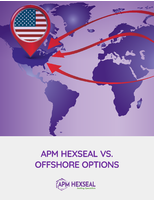Pharmaceutical Industry Automation Expenditures Will Continue to Grow
Dedham, Massachusetts; April 3, 2006: Pharmaceutical manufacturing is evolving from a high margin, large volume, make-to-stock, supply-driven operation to a price sensitive, small volume, flexible, make-to-order, personalized, value-driven services operation. With limited available capital, equipment, and talented human assets, maximizing asset utilization and return on assets is becoming vital to future success and survival. Companies are building manufacturing cultures that foster innovation and teamwork while utilizing common tools, technologies, and standards that deliver added value and financial benefit to their businesses.
"The pharmaceutical industry is in rapid transition from a supply-driven market to a demand- and service-driven market where manufacturing efficiency and responsiveness will play a critical role in future success" according to Asish Ghosh (aghosh@arcweb.com), author of ARC's new Pharmaceutical Industry Automation Worldwide Outlook (www.arcweb.com/res/pharm).
Opportunities in Integrated Building Automation Solutions
Leading suppliers are keenly aware of the quickening pace of IT adoption in the building automation systems (BAS) market and are working hard to expand strategic differentiators to improve competitive advantage over peers. ARC expects BAS to expand in functionality to fit a broader range of applications from the largest enterprises to more focused solutions that can grow in functionality as companies increase investments.
Regulatory requirements in the Life Sciences and food markets are fueling significant investments in integrated BAS solutions. Companies in the Life Sciences industries are realizing the importance of integrated BAS to meeting the requirements of 21 CFR Part 11, the electronic-recordkeeping requirements imposed by the Food & Drug Association (FDA) in the US. Integrated BAS solutions significantly reduce the cost and time to achieving and maintaining regulatory compliance for manufacturers in the Life Sciences market. Key areas of cost savings include reduced project engineering, training, documentation, and maintenance costs.
Patient Safety Emphasized
Current manufacturing, regulatory, and technology deployment activities are placing additional emphasis on patient safety. However, the growth of counterfeit and gray market drugs, the recent exposure of a limited drug manufacturing and delivery system capacity, increased regulatory and customer requirements and an increased number of litigations continue to require deployment of additional technology that is affecting production, business operations, and supply chain processes. These deployments include: product authentication, tracking and tracing with bar code and RFID technologies; anti-counterfeit measures in packaging and product formulation.
For more information on this study, go to: http://www.arcweb.com/res/pharm
Founded in 1986, ARC Advisory Group has grown to become the Thought Leader in Manufacturing and Supply Chain solutions. No matter how complex your business issues, our analysts have the expert industry knowledge and first-hand experience to help you find the best answer. We focus on simple yet critical goals: improving your return on assets, operational performance, total cost of ownership, project time-to-benefit, and share-holder value. Further information can be obtained from ARC, Three Allied Drive, Dedham, MA 02026, 781-471-1000, Fax 781-471-1100, E-mail info@arcweb.com, Web ARCweb.com.
CONTACT: Elizabeth McAleer email:press@arcweb.com/




